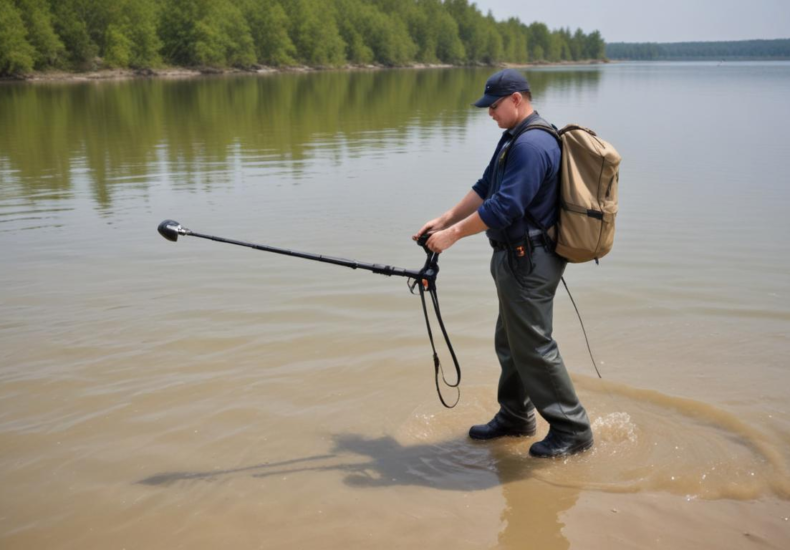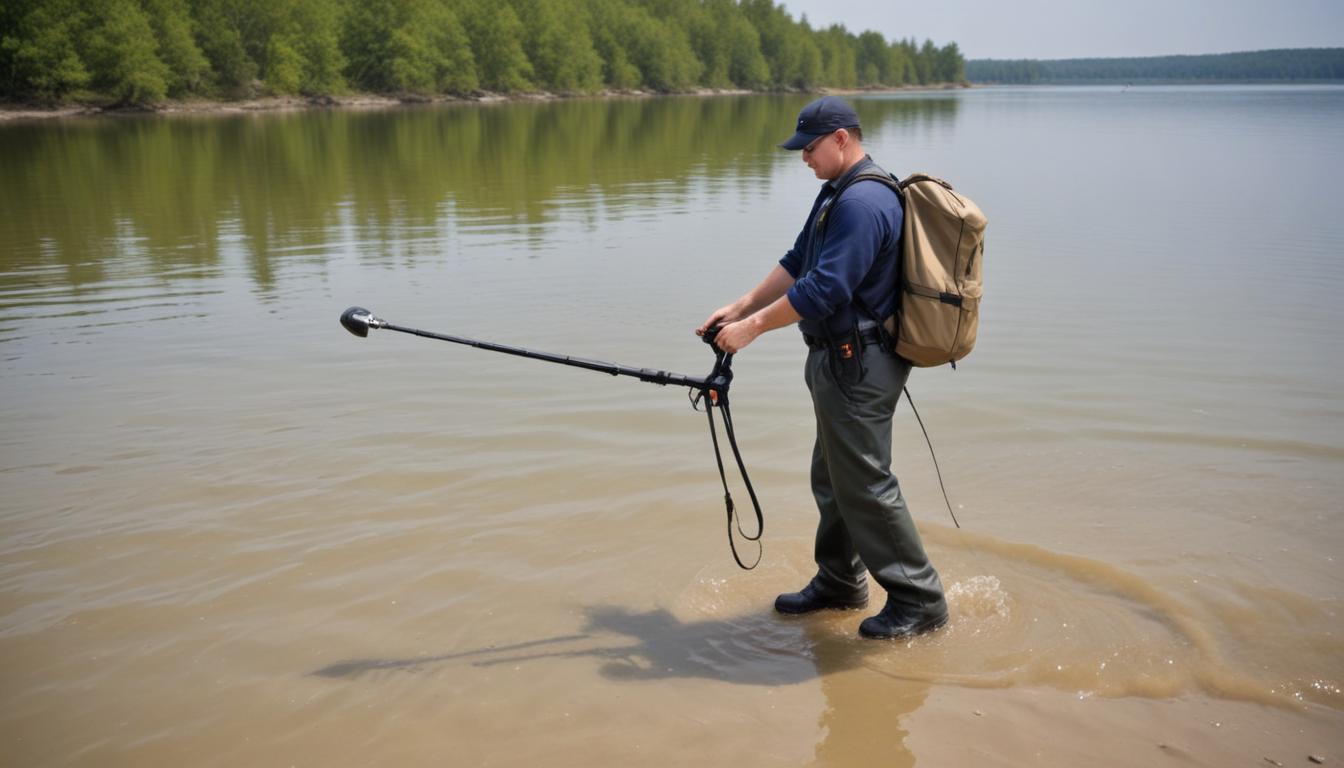
Pros and cons of waterproof metal detectors
Waterproof metal detectors offer several advantages that make them a valuable tool for enthusiasts and professionals alike. One of the key benefits is the ability to conduct searches in a variety of environments. Unlike standard detectors, waterproof detectors are not limited to dry landscapes. They can be used in shallow streams, lakes, and even in coastal areas, allowing users to explore places where valuable metals might be hidden underwater. This versatility significantly expands the scope of treasure hunting and increases the potential finds.
Another significant advantage is that waterproof detectors can be more durable and resistant to environmental factors. Since they are designed to withstand exposure to water, they are generally also better protected against moisture, dust, and dirt. This durability makes them ideal for use in more challenging terrains and less-than-ideal weather conditions, potentially prolonging the lifespan of the device.
The use of waterproof metal detectors also aligns with a greater ease of use in adverse weather conditions. Detecting does not have to stop when it starts raining, thanks to the waterproof features of these devices. For those passionate about metal detecting, this means more productive time spent on the hobby, without worrying about damaging their equipment.
Furthermore, the inclusion of innovative technologies in waterproof metal detectors often leads to better overall performance when compared to their non-waterproof counterparts. Manufacturers typically equip waterproof models with advanced features such as enhanced target identification, deeper detection capabilities, and improved sensitivity settings. These technologies not only help in differentiating between valuable items and junk but also in achieving more accurate results under water.
Finally, owning a waterproof metal detector can encourage a broader range of activities, not just limited to finding coins or jewelry. For example, users can engage in ecological efforts, such as cleaning up metals from local water bodies. Such activities can enrich the detecting experience, giving it a purpose beyond personal gain.
In sum, waterproof metal detectors offer distinct pros that include extensive usability across different environments, enhanced durability, uninterrupted use in diverse weather conditions, technological advancements for better detection, and the potential for engaging in environmentally beneficial activities. For enthusiasts looking to invest in this hobby, these factors are important considerations highlighted in many buying guides and reviews of waterproof detectors.
Limitations of waterproof metal detectors
Despite the significant benefits, waterproof metal detectors come with certain limitations that may affect their usage and overall effectiveness. One of the main drawbacks is the potential cost. Waterproof detectors often come with a higher price tag compared to standard models. This increased cost is associated with the advanced technology and durable materials required to make them waterproof. Therefore, for hobbyists on a budget, the initial investment for waterproof models might be prohibitive.
Another limitation of waterproof metal detectors is their weight and bulk. To ensure that these devices can withstand underwater conditions, additional sealing and protective components are necessary. This can make the detectors heavier and less comfortable to handle, especially during extended periods of use. The added weight may also limit maneuverability, making it challenging to search in areas with dense vegetation or rocky surfaces.
Furthermore, while waterproof models are versatile, they can sometimes offer reduced sensitivity compared to specialized non-waterproof devices. Waterproofing requires encapsulating electronic components, which can potentially dampen the detector’s ability to sense smaller or deeply buried objects. This could lead to less successful hunts, particularly when searching for minuscule fragments of metal or relics buried deep in the ground.
Maintenance can also be more demanding for waterproof metal detectors. Although they are designed to withstand water exposure, regular maintenance is crucial to ensure the seals remain effective and the technology operates without fault. Neglect in this area can result in water seeping into delicate parts of the device, leading to malfunctions or permanent damage. This makes it essential for users to be knowledgeable about proper care and to regularly check the integrity of the waterproof seals.
The pros and cons of waterproof metal detectors must be carefully weighed by potential buyers. These considerations are often highlighted in buying guides and reviews, where the limitations are juxtaposed with the benefits to help users make informed purchasing decisions. In essence, while waterproof detectors open new opportunities in metal detecting, they also demand greater upfront and ongoing investments, both financially and in terms of maintenance effort.
Key features to consider in waterproof metal detectors
When considering the purchase of waterproof metal detectors, several key features must be evaluated to ensure the best fit for your needs. First and foremost, the depth rating of the detector is crucial. This specification tells you how deep underwater the device can function effectively without succumbing to pressure or water ingress. For divers or those who plan to search in deeper waters, a higher depth rating is essential.
The type of waterproofing technology used is also pivotal. Not all waterproof detectors are built the same; some are merely water-resistant, suitable only for shallow water and brief submersions. Look for models that offer full waterproof capabilities if you intend to submerge the detector completely. The sealing technology should cover not just the control box but also the coil and the connecting cables.
Battery life is another important feature to consider. Waterproof detectors can consume more power, especially if they come with advanced features and deeper underwater capabilities. Thus, opting for a model with a long-lasting battery is beneficial to avoid frequent replacements or charges, which is particularly important in remote or underwater settings where power sources might not be readily available.
Adjustability and ergonomics of the device also play a significant role. Since handling a metal detector in water can be more challenging than on land due to resistance and buoyancy, a lightweight design and an adjustable stem become vital for comfort and efficiency. Additionally, a clear, easily navigable interface is helpful, as underwater visibility might be limited.
Lastly, sensor sensitivity and discrimination settings are critical. These determine the detector’s ability to differentiate between various types of metals and ignore junk materials. High sensitivity and adjustable discrimination can greatly enhance the success of your searches, enabling more precise targeting of valuable metals and artifacts.
Keeping these features in mind while perusing buying guides and reviews will help you align your purchase with your specific needs and environmental conditions. Understanding the pros and cons of each feature in detail is essential for making a well-informed decision that will support your metal detecting endeavors, whether on land or underwater.
Comparison with non-waterproof metal detectors

When looking to purchase a metal detector, one of the critical decisions involves choosing between waterproof and non-waterproof models. This choice significantly impacts where and how the device can be used. Non-waterproof metal detectors are generally less expensive than their waterproof counterparts. This cost efficiency makes them attractive to beginners and those not intending to venture near water bodies. They are typically lighter, making them easier to maneuver during long hunting sessions on land. However, their inability to withstand water limits their use strictly to dry environments.
In contrast, waterproof metal detectors are designed to function in both wet and dry conditions. This dual functionality allows for a wider range of detecting activities, which can be particularly advantageous in coastal regions or areas with frequent rainfall. While non-waterproof models might short-circuit or get damaged in wet conditions, waterproof detectors eliminate these concerns, providing peace of mind regardless of changes in the weather or environment. Additionally, this added versatility often mentioned in buying guides and reviews justifies the higher price point of waterproof models.
Performance is another area where differences might be observed. Non-waterproof detectors often have fewer protective layers and seals around the components, potentially offering slightly better sensitivity in air tests. In practice, however, the advanced technology in waterproof detectors often compensates for this, ensuring that their performance under water is highly effective, matching or even surpassing non-waterproof models in some scenarios. The pros and cons of each type should be carefully considered when selecting a model that best fits individual needs and environments.
Ultimately, the choice between waterproof and non-waterproof metal detectors depends largely on the user’s typical hunting locations and conditions. While non-waterproof detectors offer simplicity and are cost-effective for strictly land-based detecting, waterproof detectors provide the flexibility needed for exploring a variety of terrains and conditions. For those who might face rain or wish to explore streams, lakes, or beaches, the waterproof variety is indispensable. A thorough comparison in a reliable buying guide can help clarify these differences and assist potential buyers in making a well-informed decision that enhances their metal detecting experience.
Practical tips for maintaining waterproof metal detectors
Maintaining your waterproof metal detector is crucial for ensuring its longevity and optimal performance. Proper care involves several practices that every user should follow, starting with a thorough cleaning after each use. Rinse the detector with fresh water to remove any salt, dirt, or sand that could potentially corrode its components over time. Be particularly meticulous with the coil and the control box, even if they are fully sealed, as grit lodged in crevices can be abrasive.
Drying your waterproof detector properly is just as important as cleaning it. After rinsing, gently towel dry or air dry the device before storing it. Avoid leaving it in direct sunlight for prolonged periods, as this can damage the electronic screens and degrade the battery. Always disconnect the battery when not in use, which helps to prevent power drainage and prolongs battery life.
Regularly check the integrity of all seals and gaskets. Over time, these can wear out or get damaged, compromising the detector’s waterproof capabilities. Replace any seals that show signs of wear or damage immediately to maintain the device’s effectiveness and prevent water from entering and damaging sensitive internal components.
Lubrication of moving parts is another maintenance step that can prevent wear and tear. Use a suitable silicone lubricant on hinges or joints, as this can keep these parts moving smoothly and prevent them from seizing up. Make sure not to over-apply, as excessive lubricant can attract dirt and debris.
It’s also wise to periodically check the functionality of all the detector’s settings and features. Test the device in a controlled environment where you know metal objects exist to ensure that it still correctly identifies and locates objects. This test will help indicate if there are issues with sensitivity or discrimination settings that might require professional attention.
Storing your waterproof metal detector in a cool, dry place plays a significant role in maintaining its condition. If possible, hang the detector upright or keep it in a secure case to avoid any unnecessary pressure on its components. Keep it away from areas with high humidity, which could foster the development of mildew or corrosion.
Following these practical maintenance tips, highlighted in many buying guides, can significantly extend the life of your waterproof metal detector. Taking the time to care for your device ensures that it remains a reliable and effective tool for your treasure-hunting adventures. Remember, the cost of upkeep is minimal compared to the potential loss of functionality and performance due to neglect.
You may also like
Archives
Calendar
| M | T | W | T | F | S | S |
|---|---|---|---|---|---|---|
| 1 | ||||||
| 2 | 3 | 4 | 5 | 6 | 7 | 8 |
| 9 | 10 | 11 | 12 | 13 | 14 | 15 |
| 16 | 17 | 18 | 19 | 20 | 21 | 22 |
| 23 | 24 | 25 | 26 | 27 | 28 | |
Leave a Reply